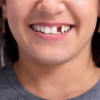
Dental Implants: the ultimate natural-looking tooth replacement
A dental implant is often regarded as being the gold standard for replacing missing teeth in the most natural way possible. The implant is placed in the jaw during a small surgical procedure. After placement and sufficient healing time, a crown is placed on top. To fill larger spaces, multiple implants can be placed before a bridge is added. This approach can be used to replace a full denture, giving you the look and function of your original full set of teeth. Dental implants can also be used to support and stabilize full dentures, eliminating many of the problems frequently experienced by denture wearers.What Is a Dental Implant?
A dental implant artificially replaces your tooth root and is used to support a crown, bridge, or denture. Conventional implants consist of three separate parts: the titanium implant post inserted into your jawbone, the abutment attached to the post providing an anchorage point for the restoration, and the actual restoration itself. There are many different implant systems, and the choice depends on the amount of bone in your jaw and the type of restoration being placed.
You will need to have a small surgical procedure to place the implant, after which it will need to be left to heal or to ‘osseo integrate’ with your natural bone. The titanium post is specially treated to encourage the growth of new bone cells on and around the post, and once osseo integration has occurred, your implant should be strong and stable, and able to support the final restoration.
Implant Supported Dentures
The major shortcoming of full dentures is the loss of a direct connection to the supporting bone. The denture rests on the gum tissue, which cannot withstand the chewing forces produced by natural teeth. Chewing efficiency drops dramatically! The use of selectively placed dental implants and dentures can re-establish that important connection to bone and improve function.
In addition, many denture wearers find their dentures become progressively looser and more difficult to retain, making eating and speaking increasingly tricky. This is due to the fact that the bony ridge that once used to hold the natural teeth will gradually reabsorb. As the ridge becomes flatter, the denture is more likely to slip and move around, something that is a particular problem with lower dentures.
Implant supported dentures are often used to stabilize lower dentures, but are equally as good for securing upper dentures. One of the main advantages of using implants to stabilize upper dentures is that the upper palate will no longer need to be covered. The upper palate contains taste buds, so uncovering it can make eating much more enjoyable!
Mini Implants
Mini implants can be used to stabilize “floating” lower dentures or provide retention for upper dentures. Mini dental implants are similar to conventional implants but do not require as extensive surgery or healing time. They are used when there is not enough bone to fit a conventional implant or finances don’t permit.
Why Implants?
The bone surrounding teeth is specialized for that purpose. Every time you bite or chew on a natural tooth, these forces are transmitted through the crown, into the root, and out into the surrounding bone. This stimulation helps keep the surrounding bone healthy and promotes the growth of new bone cells. When the tooth is lost, this bone begins to shrink away as it cannot receive any stimulation from the tooth root. With the loss of many teeth, the shrinkage can become extensive—especially when full dentures are worn, as the pressure exerted on the gums can speed up bone loss. That’s why choosing quality dental implants services is essential for long-term oral health.
Many of the muscles responsible for facial expression are attached to this bone. With tooth loss the muscles will lose this connection to the bone. As a result, the face can begin to sag and collapse in on itself as the facial dimensions are lost. This is something that can be prematurely aging as it can lead to lines and wrinkles developing.
Implants replicate a natural tooth root, so the surrounding bone receives the necessary stimulation to remain healthy and strong. Implants can stabilize dentures and will help prevent the bone loss and facial aging caused by unsupported dentures. Dental implants make it easier to eat a nutritionally sound and healthy diet, and aid digestion through enabling foods to be properly chewed.
Dental implants can be the healthiest way of replacing missing teeth, and will also give the best and most natural looking results.



